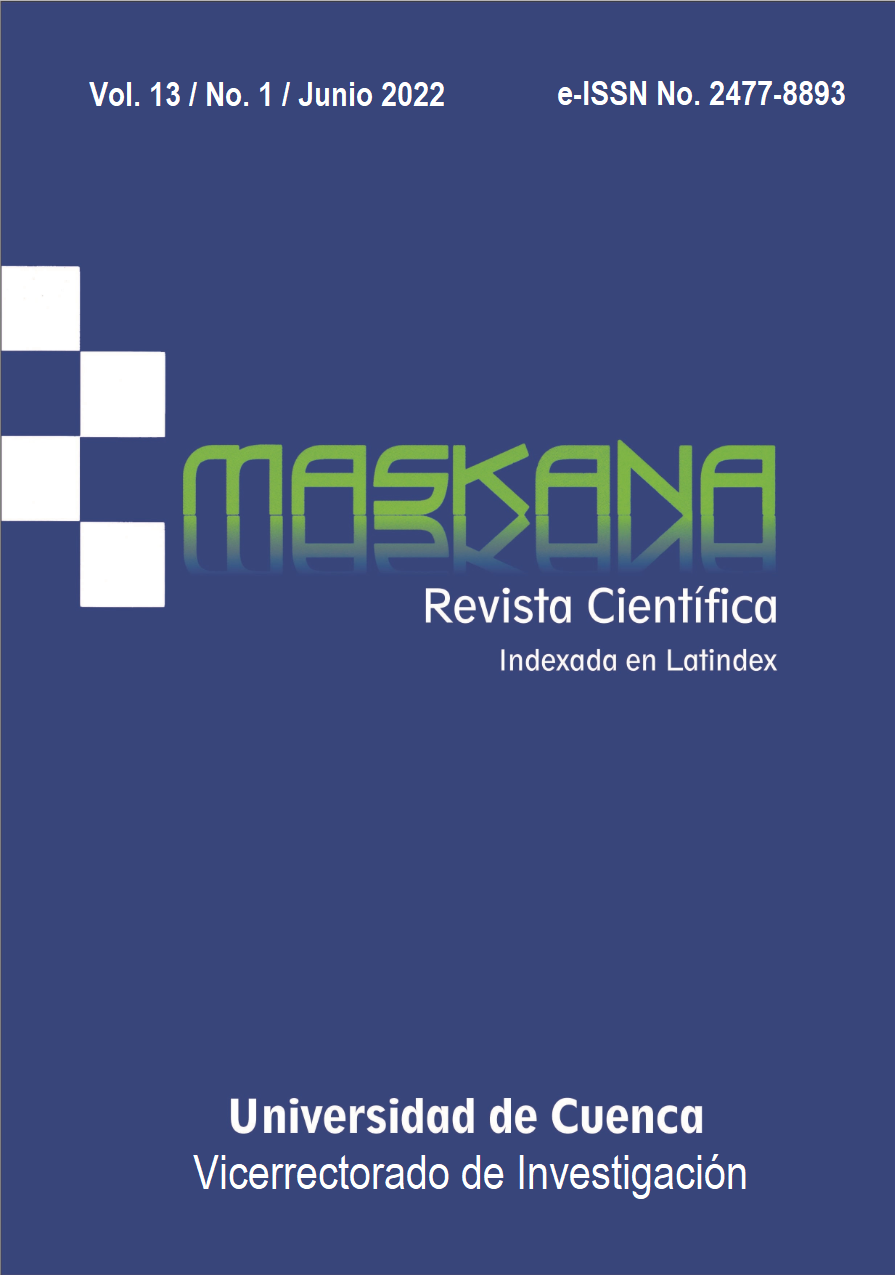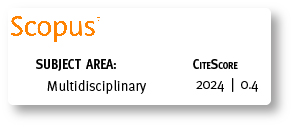Service-Learning experiences in interventions to improve the reading skills in schoolchildren of Educational Units of Cuenca City
DOI:
https://doi.org/10.18537/mskn.13.01.05Keywords:
Service-Learning, reading, schoolchildren, intervention, psychology, gamificationAbstract
The objective of the research was to describe the Service-Learning experiences of thirteen students of the Community Service Practices II (PSC II) on the intervention process in schoolchildren with reading difficulties in the educational units of the Cuenca canton. In addition, the research focused on evaluating the perception of student-tutors about children's reading difficulties and the most used gamification tools in the intervention process. The study had a descriptive scope with a non-experimental cross-sectional design. The results obtained were analyzed using the SPSS software, which made it possible to distinguish that the PSC II students conclude that the academic training received by the university has been appropriate for their academic and professional life. On the other hand, the most used gamification tools observed during telecare were: Genially and PowerPoint Presentations. In conclusion, we proposed to continue carrying out projects that involve learning-service for the pre-professional preparation of university students and to carry out studies with larger populations.
Downloads
Metrics
References
Alarcón-Diaz, M. A., Alarcón-Diaz, H. H., Rodríguez-Baca, L. S., & Alcas-Zapata, N. (2020). Intervención educativa basada en la gamificación: experiencia en el contexto universitario. Eleuthera, 22(2), 117-131. https://doi.org/10.17151/eleu.2020.22.2
Arias, M., Gutiérrez, C., & Rodríguez, J. (2021). La Gamificación: propuesta para favorecer la comprensión lectora en el estudiante del contexto rural. https://repository.ucc.edu.co
Baddeley, A. (1990). Human memory: theory and practice. In: Balint, G., Antala, B., Carty, C., Mabieme, J-M. A., Amar, I. B., & Kaplanova, A. (Eds.), Uniwersytet Śląski. Lawrence Erlbaum Associates. https://doi.org/10.2/JQUERY.MIN.JS
Brenes, C., & de los Ángeles, M. (2013). Escritura y lectura: Hecho social, no natural. Actualidades Investigativas En Educación, 13(3), 1-23.
Castro, J. (2016). Ambiente de aprendizaje con gamificación para desarrollar el proceso lector en estudiantes de primer grado de educación básica. Trabajo de grado, 64 pp. Universidad Autónoma de Bucaramanga, Facultad de Educación Bucaramanga, Santander, Colombia. https://repository.unab.edu.co/bitstream/handle/20.500.12749/3184/2016_Tesis_Castro_Mozo_Jaime_Jair.pdf?sequence=1&isAllowed=y
Cuestos, F. V. (2010). Psicología de la lectura (8th ed.). Wolters Kluwer.
Facultad de Psicología. (2021). Sílabo de Prácticas de Servicio Comunitario II. Universidad de Cuenca, Cuenca.
Fardo, M. L. (2012). KAPP, Karl M. The gamification of learning and instruction: game-based methods and strategies for training and education. San Francisco: Pfeiffer, 2012. Conjectura: Filosofia e educação, 18(1), 201-206.
Ganga-Contreras, F., Rodríguez-Quezada, E., & Guiñez-Cabrera, N. (2020). Metodología de aprendizaje-servicio en un proyecto integrado de costos y marketing. Alteridad, 16(1), 51-64. https://doi.org/10.17163/alt.v16n1.2021.04
García Ordóñez, E., & Fernández Lorenzo, G. (2022). Intervención educativa mediante una propuesta de gamificación para mejorar la adhesión a la dieta mediterránea en estudiantes gallegos de primaria. Retos, 44(1), 128-135. https://recyt.fecyt.es/index.php/retos/index
Gómez Zapata, E., Defior, S., & Serrano, F. (2011). Mejorar la fluidez lectora en dislexia: diseño de un programa de intervención en español. Escritos de Psicología / Psychological Writing, 4(2), 65-73. https://doi.org/10.5231/psy.writ.2011.1007
Hernandez, A. (2012). Procesos psicológicos básicos. In RED TERCER MILENIO. 252 pp. [PDF] aliat.org.mx
Hinestrosa, F. (2014). Codificación, descodificación y recodificación. Revista de Derecho Privado, 27, 3-13
Londoño, L. (2009). Attention as a basic psychological process. Pensando Psicología, 5(8), 91-100.
Mayor Paredes, D. (1969). Aprendizaje-servicio: una práctica educativa innovadora que promueve el desarrollo de competencias del estudiantado universitario. Actualidades Investigativas En Educación, 18(3), 1-22. https://doi.org/10.15517/aie.v18i3.34418
Martín-Garcia, X., Bär-Kwast, B., Gijón-Casares, M., Puig-Rovira, J. M., & Rubio-Serrano, L. (2020). El mapa de los valores del Aprendizaje-Servicio. Alteridad, 16(1), 12-22. https://doi.org/10.17163/alt.v16n1.2021.01
Morera-Huertas, J., & Mora-Román, J. J. (2019). Empleo de la gamificación en un curso de Fundamentos de Biología. Revista Electronica Educare, 23(2), 1-13. https://doi.org/10.15359/ree.23-2.10
Muntean, C. (2020). Raising engagement in e-learning through gamification. DocPlayer, 1, 1-3.
Oliva, H. (2016). La gamificación como estrategia metodológica en el contexto educativo universitario. Realidad y Reflexión, 44(1), 29-47.
Ortiz-Colón, A. M., Jordán, J., & Agredal, M. (2018). Gamificación en educación: una panorámica sobre el estado de la cuestión. Educación Pesquisa, 44, 1-17. https://doi.org/10.1590/S1678-4634201844173773
Papalia, D., & Martorell, G. (2017). Desarrollo humano. In: McGraw Hill Education (Vol. 13). McGraw-Hill/Interamericana Editores.
Paredes, D. M. (2018). Aprendizaje-servicio: una práctica educativa innovadora que promueve el desarrollo de competencias del estudiantado universitario. Actualidades Investigativas En Educación, 18(3), 1-22.
Portellano, J. A. (2005). Introducción a la neuropsicología (J. M. Cejudo, Ed.). McGraw-Hill/Interamericana Editores.
Puig, J. M., & Palos, J. R. (2006). Rasgos pedagógicos del aprendizaje-servicio. Cuadernos de Pedagogía, 357, 60-63.
Ramírez, J. L. (2014). Gamificación. Mecánicas de juegos en tu vida personal y profesional. Alfaomega Grupo Editor.
Reyes, D. (2014). Gamificación de espacios virtuales de aprendizaje. Centro de Formación Virtual. 16 pp. http://revistas.umce.cl/index.php/contextos/article/view/1390/1423
Villagrasa, S., Fonseca, D., & Marc, R. (2014). GLABS: mecánicas de juego para sistemas de gestión del aprendizaje. CISTI, 462-468. https://www.academia.edu/49990880/GLABS_Gamification_for_learning_management_systems_GLABS_Mecánicas_de_juego_para_sistemas_de_gestión_del_aprendizaje
Werbach, K., & Hunter, D. (2012). For the win how game thinking can revolutionize your business. Wharton Digital Press, 1-144.
Woolfolk, A. (2010). Psicología Educativa. PEARSON, Prentice Hall. 647 pp. https://crecerpsi.files.wordpresscom/2014/03/libro-psicologia-educativa.pdf
Published
How to Cite
Issue
Section
License
Copyright (c) 2022 Steeven Marín-Balcázar, Gabriela Atamaint-Torres

This work is licensed under a Creative Commons Attribution 4.0 International License.
Copyright © Autors. Creative Commons Attribution 4.0 License. for any article submitted from 6 June 2017 onwards. For manuscripts submitted before, the CC BY 3.0 License was used.
![]()
You are free to:
 |
Share — copy and redistribute the material in any medium or format |
 |
Adapt — remix, transform, and build upon the material for any purpose, even commercially. |
Under the following conditions:
 |
Attribution — You must give appropriate credit, provide a link to the licence, and indicate if changes were made. You may do so in any reasonable manner, but not in any way that suggests the licenser endorses you or your use. |
| No additional restrictions — You may not apply legal terms or technological measures that legally restrict others from doing anything the licence permits. |









